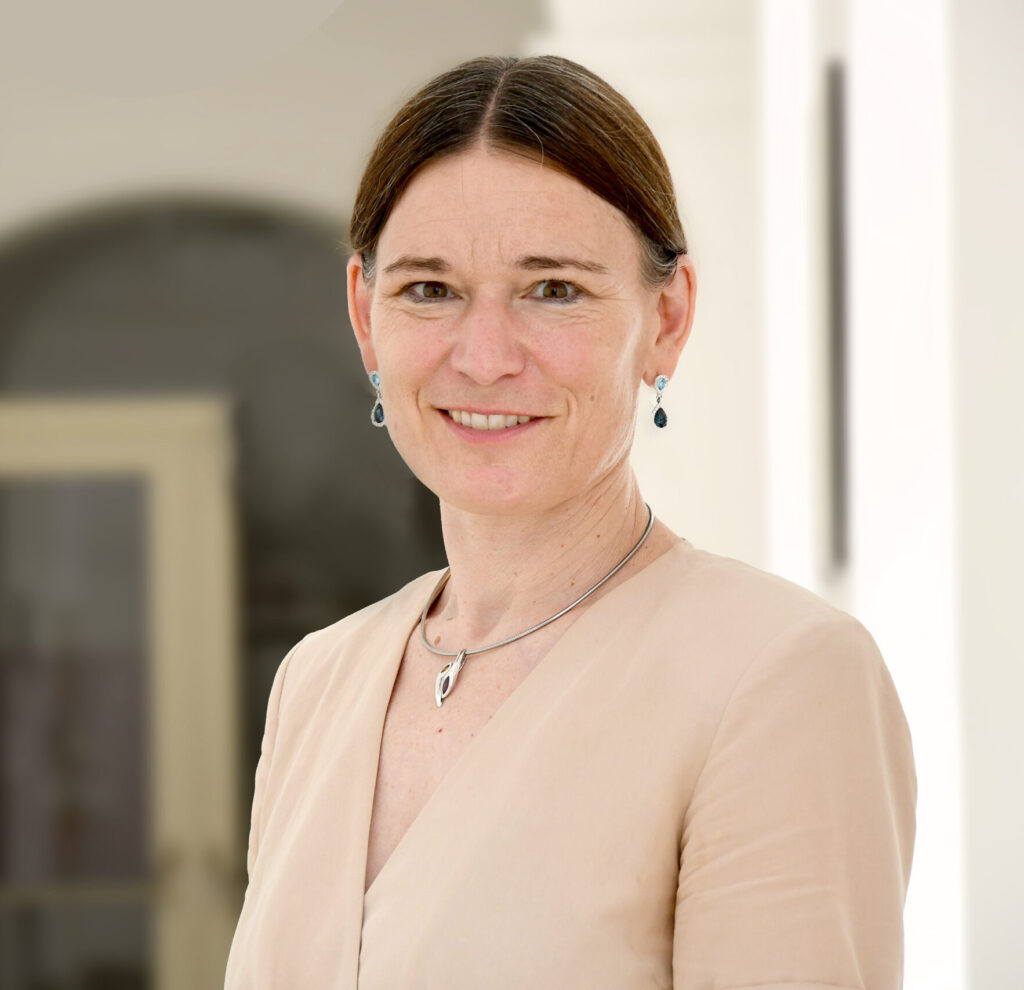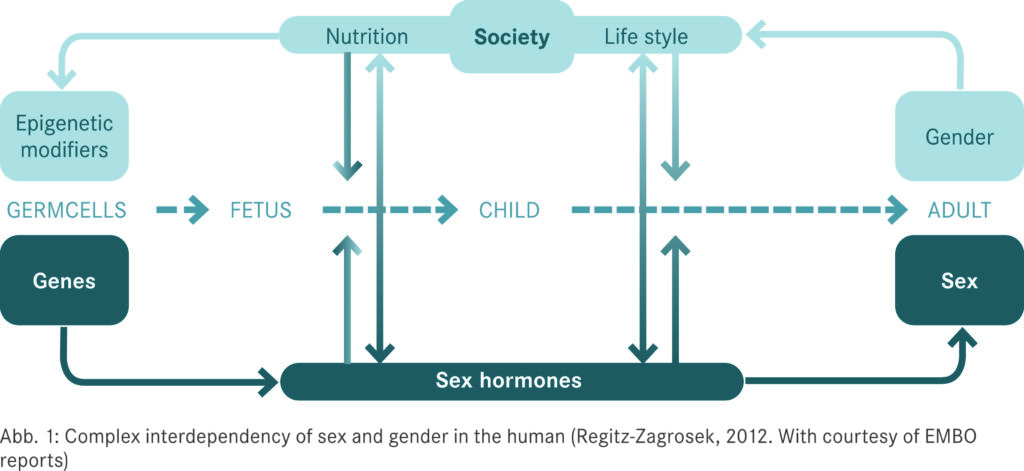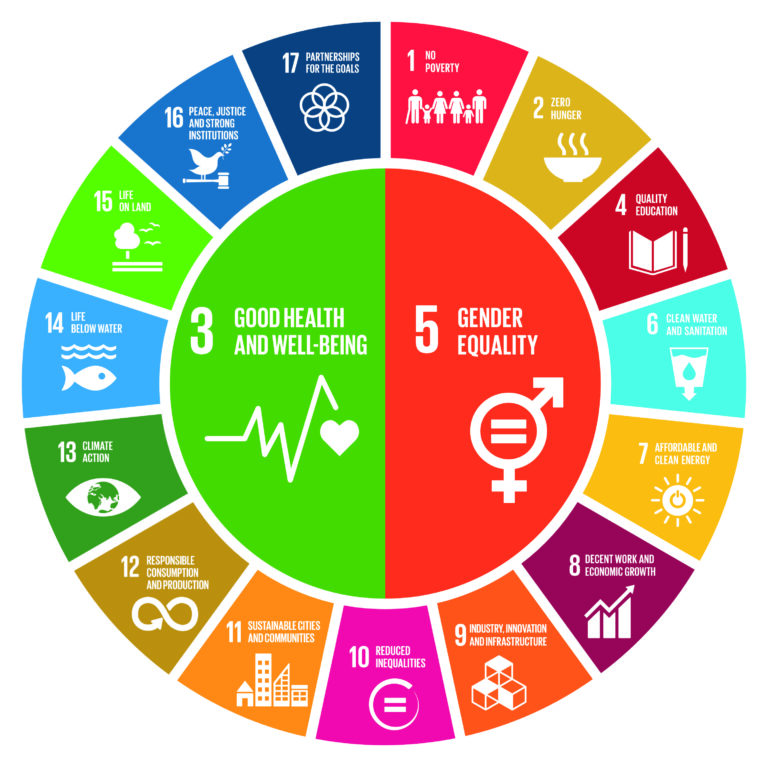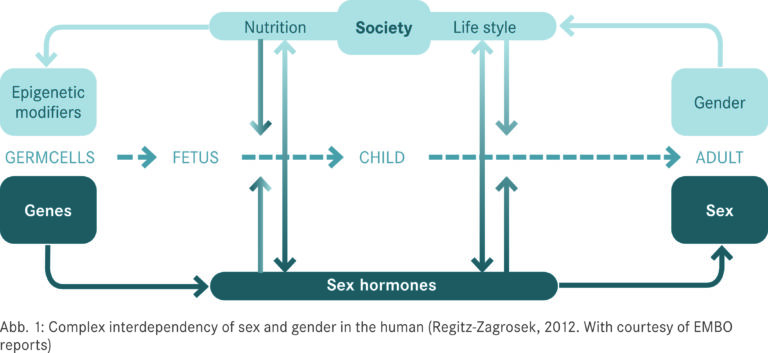
Innrain 66
6020 Innsbruck,Austria
Email: Sabine.Ludwig@i-med.ac.at
Website: https://www.i-med.ac.at/diversitaet/
Research year
Research Branch (ÖSTAT Classification)
303010, 303012, 303026, 303027, 303040, 305902, 501021, 504013, 504014, 502060, 504031, 303025
Keywords
Diversity in Medicine, gender mainstreaming, Gender medicine, global health, interpersonal violence, medical education, public health, sexuality, social norms/ideologies, and women’s/men’s health
Research Focus
The major research topics of the institute are:
-Diversity in Medicine
-Gender Medicine
-women’s / men’s health
-global health /public health
-sexuality
-sexual and gender minorities
-medical and health professions education research
-gender mainstreaming
-social norms/ideologies
-interpersonal violence
-refugee and migrant health
General Facts
The institute was founded in September 2023 with the aim to generate data on sex, gender and further diversity aspects in medicine and healthcare. Global health issues are also being investigated. The institute is committed to contributing to the achievement of the United Nations Sustainable Development Goals and the Agenda 2030, especially SDG 3 “Good health and well-being” and SDG 5 “Gender Equality: Achieving gender equality and empowering all women and girls.” The director of the institute is one of the editors of the SDG 3 reference work of the Springer Nature Group alongside Ilona Kickbusch, Dorli-Kahr Gottlieb (European Health Forum Gastein) and Rüdiger Krech (World Health Organization).
Research
The research of the institute focuses on diversity in medicine, healthcare and the health system. Here, the definition of diversity is based on the six categories outlined in the Austrian Equal Treatment Act: sex/gender, age, cultural background, sexual orientation, disabilities / impairment and religion. Socioeconomic status, including income and education and further determinants of health are all taken into consideration. Figure 2 illustrates the complex interaction of sex (biological dimension) and gender (sociocultural dimension). The institute’s mission is the collection of data on health status, health behaviours, prevention, health promotion and use of healthcare services of diverse groups of the population. Our ultimate goal is to improve health for all. The research focuses on how to design prevention and health promotion programmes, as well as rehabilitation measures. It integrates a diversity perspective to improve the use of different population groups and adapt them to their specific needs. Regarding health promotion measures, the focus lies on integrating a diversity perspective in health promotion measures at the workplace and thus occupational health management.
The institute is determined to contribute to a reduction of the gender health gap. It will focus on the needs of women* and girls and address further issues of gender equality and career development in the health sector nationally, in Europe and worldwide. The European chapters of Women in Global Health along with further chapters worldwide, will evaluate the barriers and facilitating factors for achieving leadership positions in global health and in the health sector. Further issues of diversity in global health as well as diversity issues in One Health are also subject of investigation.
The World Health Organization’s report on health equity for persons with disabilities has exposed a lack of data. The institute will address this by conducting research projects on the health needs and barriers to health services of persons with disabilities. It will also raise the awareness of health professionals on this issue. In addition to collecting data on the health of persons with disabilities, the institute also intends to close the data gap on the specific needs of persons with migrant experience and refugees, with a focus on migrant women*.
Further research is being conducted in the field of medical and health professions education, focusing on sex, gender and the integration of further diversity aspects in health professions curricula and thus to improve knowledge, competencies and awareness of students and the future health workforce on sex, gender and further diversity aspects in healthcare.
Subject of investigation also include discriminatory experiences of students and professionals working in academic medicine and the health sector with the objective of developing a code of conduct in cooperation with the Working Group for Equal Treatment Issues and the Coordination Centre for Gender Equality, Affirmative Action for Women and Diversity of the Medical University Innsbruck, Austria.
Further research focuses on the impact of gender norms on interpersonal interactions, health and illness, highlighting how strict adherence to gender norms in specific contexts can lead to behavioural and experiential limitations as well as inequalities. The contexts in which this is investigated include sexuality, experiences of violence, migration, education, academic careers, seeking and receiving medical help, and medical practice.
Another field of research is interprofessional and transdisciplinary cooperation and thus the improvement of the cooperation of different professions in the health sector. This field also aims at addressing and collecting evidence and data on sex, gender and further diversity issues in all health professions including, e.g., physiotherapy, occupational therapy, speech therapy, midwifery and nursing.

Pictures
Selected Publications
Birke J, Hochleitner M, Komlenac N. Similar Employment of Coercion Strategies by Men and Women: Links Between Conformity to Traditional Masculine Ideologies and Sexual Coercion Following Sexual Rejection. The Journal of Sex Research. 2024, 1–14. https://doi.org/10.1080/00224499.2024.2395481
Hoffmann C, Schneider T, Wannous C, Nyberger K, Haavardsson I, Gilmore B, Quigley P, Winkler AS, Ludwig S. Impact of COVID-19 on the private and professional lives of highly educated women working in global health in Europe-A qualitative study. Frontiers in Global Women‘s Health. 2023;4:1009473
Komlenac N, Lamp E, Maresch F, Walther A, Hochleitner M. Not always a “buffer”: Self-compassion as moderator of the link between masculinity ideologies and help-seeking intentions after experiences of intimate partner violence. Journal of Interpersonal Violence 2023, 38(17-18), 10055-10081. doi: 10.1177/08862605231169766
Komlenac N, Langmann F, Hochleitner M. Explorative questionnaire study about education with regard to the health of sexual minorities at an Austrian medical university. Journal of Homosexuality. 2023, 70(12), 2955-2977. doi: 10.1080/00918369.2022.2085937
Komlenac N, Stockburger K, Birke J, Hochleitner M. Social Cure Model: Testing the link between identity centrality and body appreciation in diverse sexual orientation and gender identity groups. Int J Equity Health. 2024;23:Article 185. doi: 10.1186/s12939-024-02268-3
Komlenac N, Neugebauer L, Birke J, Hochleitner M. All employees benefit: Arguments that help increase support for affirmative action in academic careers. Humanit Soc Sci Commun. 2023;10:Article 981. doi: 10.1057/s41599-023-02508-x
Komlenac N, Eggenberger L, Walther A, Maresch F, Lamp E, Hochleitner M. Measurement invariance and psychometric properties of a German-language Conformity to Masculine Norms Inventory among cisgender sexual minority and heterosexually identified women and men. Psychol Men Masc. 2023;24:248-60. doi: 10.1037/men0000429
Ludwig S, Jenner S, Berger R, Tappert S, Kurmeyer C, Oertelt-Prigione S, Petzold M. Perceptions of lecturers and students regarding discriminatory experiences and sexual harassment in academic medicine – results from a faculty-wide quantitative study. BMC Med Educ 24, 447 (2024). https://doi.org/10.1186/s12909-024-05094-x
Ludwig S, Seeland U, Arnold L, Roehle R, Dickob C, Hauck M, Ucar J, Willich SN, Reinhold T, Roy R. Analyse des gesundheitlichen und sozialen Nutzens sowie gesundheitsökonomische Evaluation von Maßnahmen des Betrieblichen Gesundheitsmanagements bei der Bundeswehr in Deutschland. [Analysis of health and social benefits and economic evaluation of workplace health promotion measures in the German Federal Armed Forces] Das Gesundheitswesen 2024; 86(S 05): S339. DOI: 10.1055/s-0044-1794369
Ludwig S, Schmitz F, Honerkamp L, Jacobs F, Guezelsoy L, Pinilla S, Kulisch C, E. Schwienhorst-Stich E, Akkaya-Kalayci T, Meyer T, Papan C, Bauer D, Rumpfhuber K, U. Nachtschatt U, Brunk I, Schönefeld E, Mews C. Stand der Integration von rassismuskritischen Themen in die medizinische Ausbildung – erste Ergebnisse aus der Erarbeitung eines Positionspapiers. [Curricular integration of anti-racist aspects in medical education in German speaking countries – initial results from a position paper]
Düsseldorf: German Medical Science GMS Publishing House; 2024. DocV-27-02.
doi: 10.3205/24gma111
Ludwig S. Advancing gender equality in health through FemTech and inclusive digitalisation. Eurohealth, Special Issue, European Health Forum Gastein, Volume 30, number 2, WHO 2024: 16-20.
iris.who.int/bitstream/handle/10665/378805/Eurohealth-30-2-2024-eng.pdf?sequence=5
Ludwig S. Genderbias in der Patient:innenbehandlung [Gender bias in the treatment of patients]. JATROS Pneumologie & HNO 1 / 2025: 6-8. www.universimed.at/at/article/kardiologie-gefaessmedizin/genderbias-patient-474730
Ludwig S, Reinhold T, Roehle R, Dickob C, Bauer MD, Hauck M, Ucar J, Arnold L, Willich SN, Seeland U, Roy R. Sex/Gender and age differences in health behavior of employees participating and not participating in Workplace Health Promotion Measures in the German Federal Armed Forces – A cross-sectional study. European Journal of Preventive Cardiology,
Volume 31, Issue Supplement_1, June 2024, zwae175.125, https://doi.org/10.1093/eurjpc/zwae175.125
Ludwig S, Seeland U, Arnold L, Roehle R, Dickob C, Hauck M, Ucar J, Willich SN, Reinhold T, Roy R. Workplace health promotion in the German Federal Armed Forces – Economic analysis and health benefits. Eur J Public Health, Volume 34, Issue Supplement_3, November 2024, ckae144.1111, https://doi.org/10.1093/eurpub/ckae144.1111
Seeland U*, Roy R*, Roehle R, Dickob C, Bauer MD, Ucar J, Hauck M, Arnold L, Willich SN, Reinhold T, Ludwig S. Disease distribution disaggregated by sex and age in employees of the German Federal Forces to improve work health promotion measures. European Journal of Preventive Cardiology, Volume 31, Issue Supplement_1, June 2024, zwae175.027, https://doi.org/10.1093/eurjpc/zwae175.027
*shared first authorship
Seeland U, Hauck M, Roehle R, Dickob C, Ucar J, Arnold L, Willich SN, Reinhold T, Ludwig S*, Roy R*. Workplace health promotion measures and use of medical services in the German Federal Armed Forces. Eur J Public Health, 2024 Oct 28;34 (Suppl 3):ckae144.1650. doi: 10.1093/eurpub/ckae144.1650
*shared last authorship
Walser J, Hochleitner M, Komlenac, N. Support for affirmative actions to increase inclusivity of intersex* persons at an Austrian medical university. BMC Medical Education. 2023, 23, Article 825. doi: 10.1186/s12909-023-04830-z
Selection of Funding
Diversity Prize, Austrian Federal Ministry of Education, Science and Research, 2024 (€25,000.-)
Province of Tyrol, General science funding, 2024: F.49915 (€9,000.-)
German Federal Ministry of Education and Research. Global Health Research Alliance / GLOHRA. Sealing the “Leaky Pipeline”: Advancing Gender Equity in Global Health Research Leadership / Workshop. 2024 (€15.000,00.-)
German Federal Ministry of Education and Research. Career Network Interprofessional Collaboration in Healthcare (KIZ_GESUND) “Personnel Recruitment and Development for Universities in Applied Sciences“, 2023-2028 (€1.764.840,00.-)
German Academic Exchange Service (DAAD). Come2KH – Internationalisation in Social and Health Professions. HAW.International 2023-2024, 2023-2024 (€ 306.558,82.-)
German Federal Ministry of Defense. Study on social and health benefits and economic analysis of workplace health promotion measures in the German Federal Armed Forces, 2021-2025 (€1.678.642,75.-)
Collaborations
Nora Anton, Beate Kampmann, Charité Center for Global Health, Charité – Universitätsmedizin Berlin, Berlin, Germany
Dorli Kahr-Gottlieb, European Health Forum Gastein, Bad Hofgastein, Austria
Ilona Kickbusch, Graduate Institute of International and Development Studies, Geneva, Switzerland
Ute Lange, Bochum University of Applied Sciences, Bochum, Germany
Gundula Ludwig, Center Interdisciplinary Gender Studies Innsbruck (CGI), Leopold Franzens University, Innsbruck Austria
Barbara Plagg, University Training Center for Health Professions, Bolzano, Italy
Magda Robalo, Women in Global Health, Washington, United States of America
Ute Seeland, Department of Gender- and Sex-specific Medicine, Otto-von-Guericke University Magdeburg, Germany
Christoph Singer, Research Center Medical Humanities, Leopold Franzens University, Innsbruck, Austria
Viktoria Stein, Austrian Public Health Association, Austria
Nadine Ungar, Philipp Struck, Catholic University of Applied Sciences, Mainz, Germany
Stefan N. Willich, Thomas Reinhold, Institute of Social Medicine, Epidemiology and Health Economics, Charité – Universitätsmedizin Berlin, Berlin, Germany
Andrea Winkler, Technical University Munich, Munich, Germany
Society for the Psychology of Men and Masculinities, Division 51, American Psychological Association, Washington, United States of America
German Society for Sex and Gender Specific Medicine, Berlin, Germany
Austrian Society for Sex and Gender Specific Medicine, Vienna, Austria

